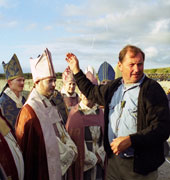|
Roy Andersson, Sweden's Most Important Contemporary Film Director
You, the Living!
by Ardeshir Seraj
|
 Roy Andersson has produced only four feature films during four decades of his film career. But, he has made more than 300 commercials. Roy Andersson has produced only four feature films during four decades of his film career. But, he has made more than 300 commercials.
His first feature film was Love Story (1970), which was also his thesis at Stockholm Film School. Giliap (1975) is his second film. Twenty five years later, he produced his third feature: Songs from the Second Floor. His fourth film, You, the Living, was screened in 2007.
“Commercial” as Art
During my early days in Sweden, I watched a commercial made by Andersson at a theater, which greatly impressed me. Later on in 1985, I watched his first feature, Love Story. During my internship at his studio in 1993, his second film Giliap increased my interest in his work. Andersson's Studio 24 in Stockholm was a special workshop where they sometimes worked round the clock. During my two-year work there, many commercials were produced. They were not interesting, per se, but I was captivated by Andersson's image language. In his commercials, he used images to create an environment which was filmed using fixed camera and wide lens. Despite other commercials, human beings were centerpiece of his commercials.
All those working at his studio were involved in making films. Because of my own contribution, I managed to understand Andersson's unconventional visual narrative. That narrative was far from rapid editing and the scenes were very calm and static with few details, allowing viewers to use their imagination. Andersson's commercials pushed me further and further into knowing his style. I always mused over his choices in films. After talking to Andersson and his cameraman, István Borbás, I could understand what kind of actors and extras were required for a film and looked for them around Stockholm. It was sometimes a difficult job. Back then, I did not know difficult moments were an integral part of filmmaking.
Once preparations were over, it was time to make the scene. To do so, we leafed through photos and drawings. We cut photos out of books and created a collage. We never stopped chatting with Andersson, cinematographer and other crewmembers. If any scene was to be made outside the studio, Andersson designed it in his mind and looked for real locations. Anyhow, changes were always introduced to have a better outcome. Every scene was shot from two weeks to two months and it was very long for a 30-40-second commercial. When the set was designed, I always talked to Andersson. He had processed the film in his mind for weeks, but the text was written a few hours before shooting.
Hundreds of visible and invisible details were needed: lighting, height of the camera, appropriate lens and so on. Andersson scrutinized everything and he could find faults with invisible materials. "Our viewers feel them and we should take this issue into account," he used to say of invisible details. Now, it was time for shooting and everyone had to concentrate on the film.
Once, we were working on a less than 35-second sequence. I remember well the filming was repeated 80 times. All those working there had to have an artistic sense and to be flexible. Sometimes, the shooting lasted throughout the night and then we had to take the film to laboratory for development. The following night, we watched the result of three months of tough and intensive work. If Roy Andersson was not happy with the work, we had to redo everything. This went on until Andersson was satisfied.
SUBSCRIBE
[Page: 76]
|
|
|
|
|
President & Publisher
Massoud Mehrabi
Editors:
Sohrab Soori
Translators:
Sohrab Soori
Behrouz Tourani
Zohreh Khatibi
Saeed Khamoush
Contributors
Shahzad Rahmati
Saeed Ghotbizadeh
Advertisements
Mohammad Mohammadian
Art Director
Babak Kassiri
Ad Designers
Amir Kheirandish
Hossein Kheirandish
Cover Design
Alireza Amakchi
Correspondents
E.Emrani & M. Behraznia (Germany)
Mohammad Haghighat (France)
A. Movahed & M. Amini (Italy)
Robert Richter (Switzerland)
F. Shafaghi (Canada)
B. Pakzad (UAE)
H. Rasti (Japan)
Print Supervisors
Shad-Rang
Noghreh-Abi
Gol-Naghsh
Subscription & Advertising Sales
Address: 10, Sam St., Hafez Ave., TEHRAN, IRAN
Phone: +98 21 66722444
Fax: +98 21 66718871
info@film-magazine.com
Copyright: Film International
© All rights reserved,
2023, Film International
Quarterly Magazine (ISSN 1021-6510)
Editorial Office: 5th Floor, No. 12
Sam St., Hafez Ave., Tehran 11389, Iran
*
All articles represent views of their
authors and not necessarily
those of the editors
|
|
|

